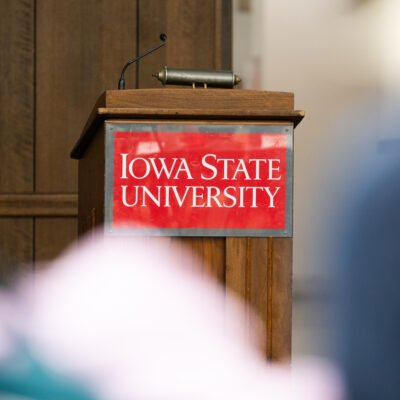Fall 2025 at Iowa State will include a new major administered by the School of Education.
The education studies major is a broad major for people interested in education as a whole.
“You are going to learn how to be a good educator,” Ann Gansemer-Topf, director of the school of education, said. “But more broadly, to provide a strong set of general skills that you could apply those skills in a variety of areas.”
Educational studies is a four-year degree program focused on students who are interested in education but may not see themselves as teachers. This degree program is designed to prepare undergraduate students for careers within the field of education outside of K-12 classroom teaching.
“If you think about how many of us are in roles where we’re educating, formal or informally, all require an understanding of teaching methods, pedagogy, how people learn… really, this degree provides opportunities for individuals to get that degree,” Gansemer-Topf said.
“The idea and need for an educational studies degree had been discussed within the School of Education for a while now and so I was responsible for not only bringing the different pieces and people together to conceptualize this new degree,” Kristina Tank, lead faculty member on this proposal, said.
Apart from this degree program, in the first two years of the educational studies major, students will take the same classes that meet ISU general education and other college-level requirements. However, the academic studies students will learn more about education as a whole in their required classes compared to a specific grade of students or class type.
The first two years provide students with a basic understanding of education theory and practice. Within the last two years of the degree program, students would pursue an emphasis area.
The three emphasis areas of the educational studies major include teaching, learning and leadership, innovation, technology and sociology and science, technology, engineering and mathematics (STEM).
The Teaching, Learning and Leadership emphasis area is designed for students interested in teaching and learning across diverse educational settings, contexts and learner groups.
The Innovation, Technology and Society emphasis area targets students keen on exploring the intersection of innovation, design, educational technology, and societal impact.
The STEM emphasis area is tailored for students focused on learning and teaching within STEM contexts and environments.
“In our STEM education technology, we are creating a new class that we are going to offer for the first time called Dilemmas in Education,” Gansemer-Topf said. “It is going to discuss and cover a lot of controversial and difficult topics within education.”
Gansemer-Topf expresses that the Dilemmas in Education course is for everyone at the university and will attract some attention.
“The education landscape is broad and continues to change as society and our world changes, and as a result, there are many career options within the field of education that go beyond traditional classroom teaching,” Tank said. “With this major, there is an opportunity for students who are interested in future careers in education around teaching, learning and instruction but not in being a licensed K-12 classroom teacher.”
There is no specific job title associated with an educational studies degree.
“People who work in museums, people who work at zoos or specifically people who are currently working at the Science Center in Des Moines are examples of the jobs you could have from this degree,” Gansemer-Topf said. “Those people are providing some educational areas that are related to the broad aspect of educational studies,”
“Our goal is that this major would prepare educators across the education landscape with the ability to design, implement and assess educational programming that advances teaching and learning for all,” Tank said.
Students in the education studies degree program will focus on objectives designed to create a strong foundation, enabling them to make meaningful contributions to the field of education.
Gansemer-Topf outlined the three student learning outcomes:
- Explore various educational systems, developing foundational knowledge and understanding of educational theory and research
- Learn to design and implement engaging and effective educational materials and programs
- Participate in a study program that aligns with their career aspirations and interests, which includes a semester-long internship experience
“Spend the first year getting a broad sense and purpose to the theory of education. Be aware of how learning and teaching impact our everyday life,” Gansemer-Topf said, advising future educational studies majors.
For those interested in educational studies, you can contact any educational academic advisor to learn more.




